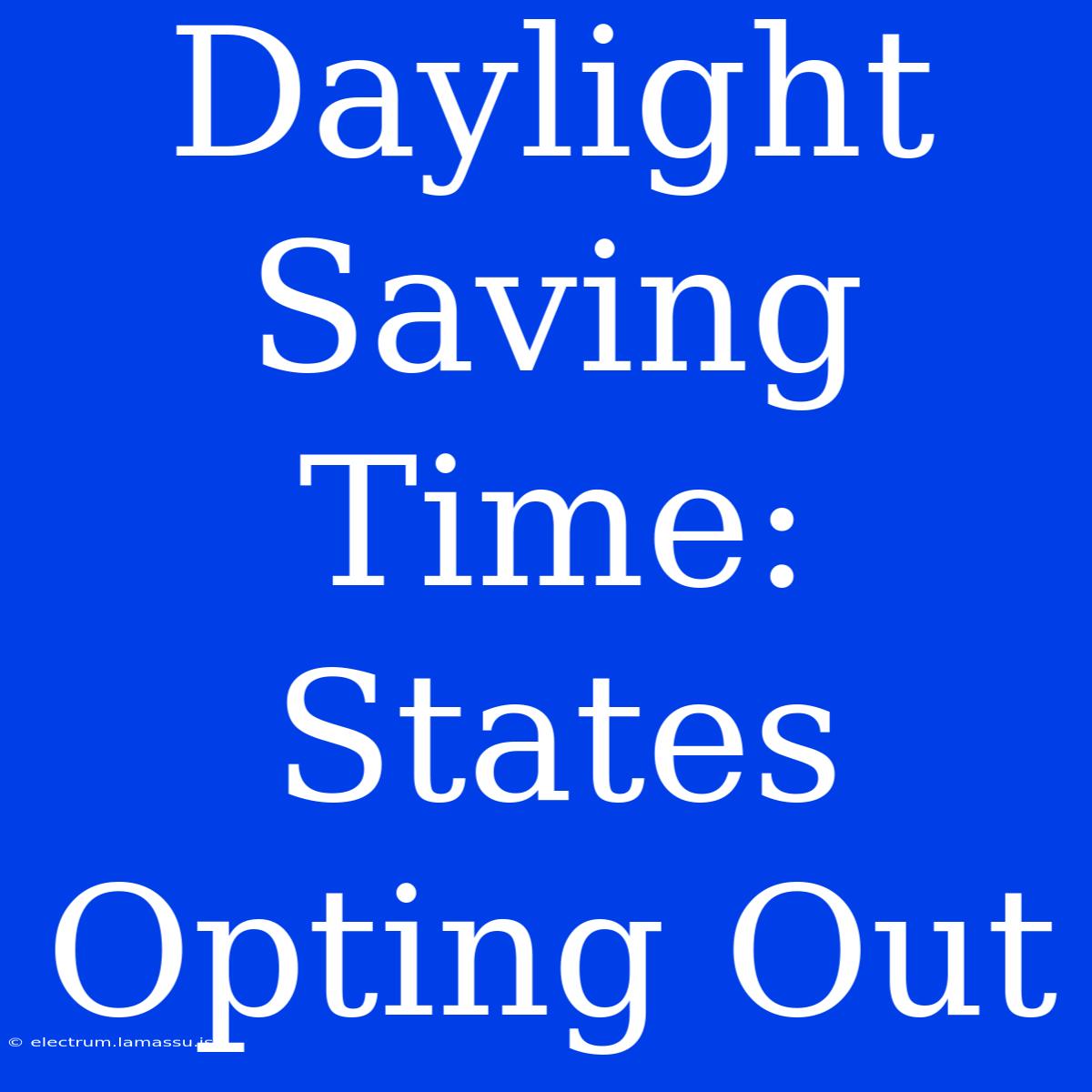Daylight Saving Time: States Opting Out - A Look at the Growing Movement
Is Daylight Saving Time outdated? Many states are pushing for permanent standard time, rejecting the twice-yearly time shifts. This move signifies a growing pushback against the practice, with arguments focusing on health, safety, and economic impacts. Editor Note: This article explores the reasons behind states opting out of Daylight Saving Time and analyzes the potential benefits and drawbacks of permanent standard time.
Why is this topic important? Daylight Saving Time (DST) has been a source of debate for decades. While proponents argue for increased daylight hours and economic benefits, critics cite negative impacts on health, productivity, and safety. The recent movement to permanently adopt standard time reflects a growing awareness of these concerns and a desire for a more consistent time schedule. This article delves into the rationale behind this shift, examining arguments for and against permanent standard time.
Analysis: To understand the rationale behind states opting out, we analyzed legislative actions, public opinion polls, and expert opinions. We also reviewed studies on the potential effects of DST on health, safety, and economic activity. This research forms the basis for our in-depth analysis of the pros and cons of permanent standard time.
Key Considerations for Permanent Standard Time:
| Consideration | Description |
|---|---|
| Health Impacts | Potential benefits for sleep patterns and reduced risk of chronic diseases |
| Safety Concerns | Potential reduction in traffic accidents and crime rates |
| Economic Implications | Impact on business operations, energy consumption, and tourism |
| Social Effects | Impact on family routines, outdoor activities, and social gatherings |
Daylight Saving Time:
Introduction: Daylight Saving Time (DST) is a practice of advancing clocks forward by one hour during the summer months to extend daylight into the evening. While it was initially implemented to conserve energy, its effectiveness remains debatable.
Key Aspects:
- Energy Conservation: While initial proponents claimed DST saved energy, current studies suggest little or no energy savings.
- Economic Impacts: DST proponents cite increased retail sales and outdoor activities as benefits, while critics argue for negative effects on productivity and work schedules.
- Health Concerns: Studies have linked DST to sleep disturbances, mood changes, and an increased risk of cardiovascular problems.
- Safety Issues: Some research suggests an increase in traffic accidents and crime during the transition periods.
Permanent Standard Time:
Introduction: Permanent Standard Time (PST) eliminates the need for time changes, offering a consistent time schedule throughout the year.
Key Aspects:
- Health Benefits: PST proponents argue for improved sleep patterns, reduced stress, and a decreased risk of chronic diseases.
- Safety Improvements: A consistent time schedule may contribute to reduced traffic accidents and crime rates.
- Economic Considerations: Potential benefits for business operations and energy efficiency, but potential negative impacts on tourism.
- Social Adjustments: PST may impact daily routines, particularly for families with children and those with outdoor hobbies.
Conclusion: The movement towards permanent standard time reflects a growing awareness of the potential drawbacks of Daylight Saving Time. States are increasingly seeking to eliminate the twice-yearly time shifts, citing potential benefits for health, safety, and economic activity. While this shift raises concerns about potential disruptions to social routines and economic activities, the potential advantages in terms of health and safety may outweigh the drawbacks.
FAQ:
Q: What states have opted out of Daylight Saving Time?
A: Currently, Hawaii and Arizona have opted out of Daylight Saving Time and remain on standard time year-round.
Q: Is there a federal law regarding Daylight Saving Time?
A: Yes, the federal Uniform Time Act establishes Daylight Saving Time and allows states to opt out, but only if they remain on standard time year-round.
Q: What are the potential benefits of permanent standard time?
A: Potential benefits include improved sleep patterns, reduced stress, fewer traffic accidents, and lower crime rates.
Q: What are the potential downsides of permanent standard time?
A: Potential downsides include disruptions to routines, potential negative impacts on tourism, and adjustments for businesses operating across time zones.
Tips for Adjusting to Permanent Standard Time:
- Prepare in Advance: Discuss the changes with family and colleagues to ensure smooth transitions.
- Be Patient: Allow yourself time to adjust to the new schedule.
- Prioritize Sleep: Make sleep a priority and establish consistent bedtime routines.
- Take Breaks: Regular breaks can help maintain focus and reduce stress.
- Stay Informed: Monitor local news and announcements regarding the implementation of permanent standard time.
Summary: The movement towards permanent standard time represents a growing desire for a more consistent time schedule. While the debate continues, the potential benefits for health, safety, and economic activity may outweigh the drawbacks. As more states opt out of Daylight Saving Time, we can expect further discussion and debate on the best timekeeping practices for the future.
Closing Message: The ongoing debate surrounding Daylight Saving Time reflects the complexities of modern life. As we navigate the potential benefits and drawbacks of various timekeeping practices, we must carefully consider the impact on all aspects of our lives.

